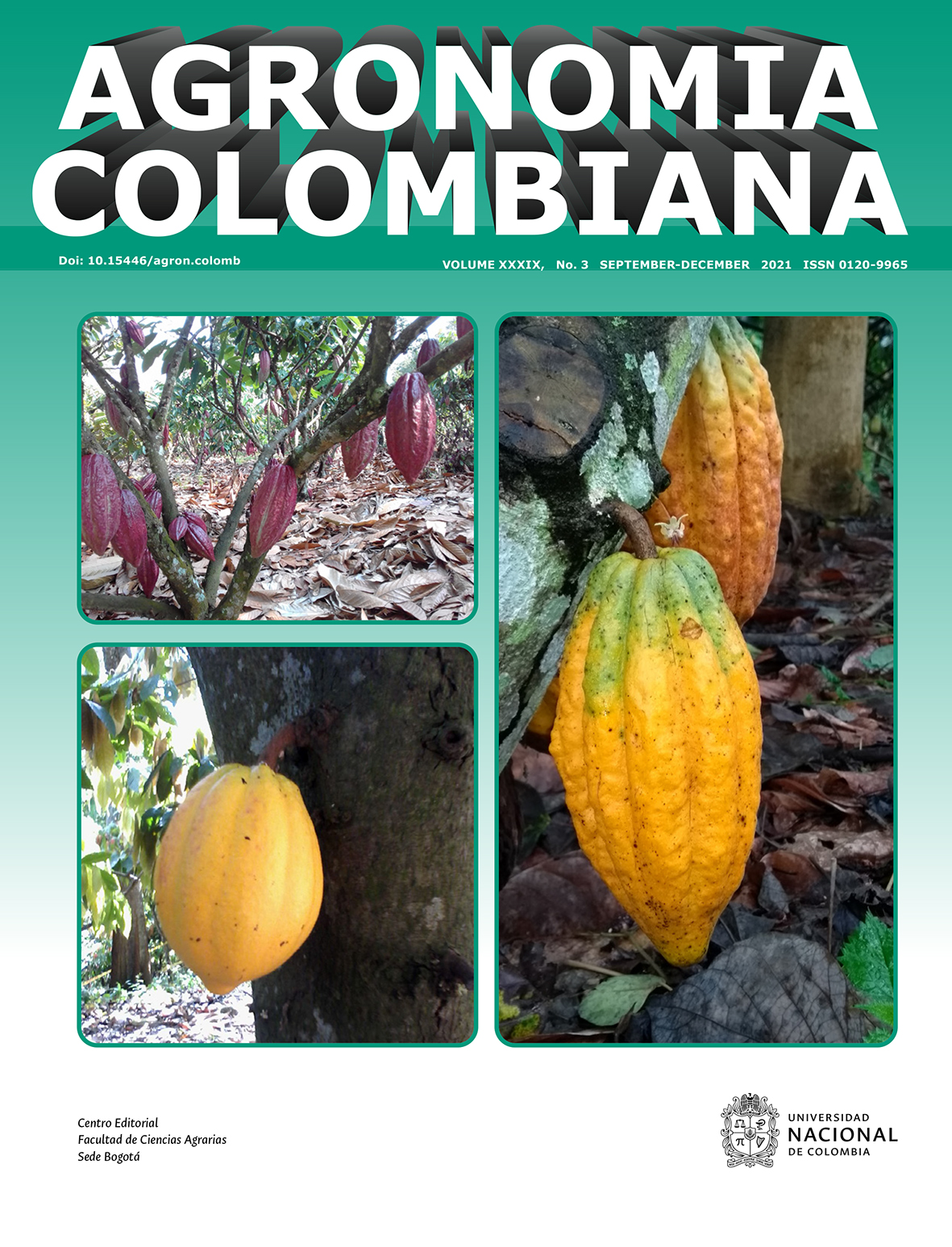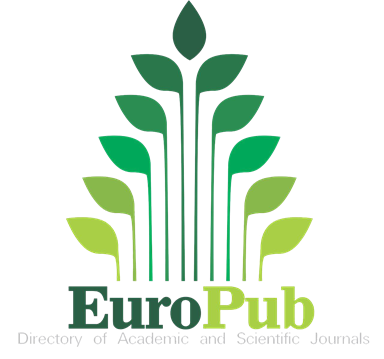Growth parameters and organoleptic characteristics of plantain (Musa AAB Simmonds cv. Farta Velhaco) at different planting densities
Parámetros de crecimiento y características organolépticas del plátano (Musa AAB Simmonds cv. Farta Velhaco) en diferentes densidades de siembra
DOI:
https://doi.org/10.15446/agron.colomb.v39n3.95232Keywords:
adaptation of cultivars, tropical agriculture, family farms (en)adaptación de cultivares, agricultura tropical, granjas familiares (es)
Downloads
In view of the role of density and spacing in the growth parameters and organoleptic characteristics of plantains, this study sought to identify the best planting density for the cultivar Farta Velhaco (Terra group) cultivated in Mato Grosso (Brazil), evaluating three spacings. For this, we carried out an experiment in a randomized block design according to the following spaces (between plants x between rows): 2.0 m x 3.0 m (density of 1,600 plants ha-1); 2.5 m x 3.0 m (density of 1,320 plants ha-1) and 3.0 m x 3.0 m (density of 1,110 plants ha-1), with 25 replicates per treatment. The following attributes were evaluated: plant height (cm); diameter of the pseudostem (cm); number of leaves; number of hands per bunch; number of fruits per hand; fresh fruit weight (g); fruit height (cm); external and internal fruit lengths (cm); fruit diameter (cm); bunch weight (kg), and productivity (t ha-1), in addition to the percentage of total soluble solids, titratable acidity, pH and flavor of the fruits. The density of 2.0 m x 3.0 m in the cultivation of the plantain group Terra cv. Farta Velhaco improves fruit classification attributes as well as the fruit organoleptic characteristics such as the percentage of total soluble solids and flavor.
En función del papel que cumplen la densidad y el espaciamiento en los parámetros de crecimiento y las características organolépticas de los plátanos, este estudio buscó identificar la mejor densidad de siembra para el cultivar Farta Velhaco (grupo Terra) cultivado en Mato Grosso (Brasil), evaluando tres espaciamientos. Para ello, realizamos un experimento en un diseño de bloques al azar según los siguientes espacios (entre plantas x entre hileras): 2.0 m x 3.0 m (densidad de 1600 plantas ha-1); 2.5 m x 3.0 m (densidad de 1320 plantas ha-1) y 3.0 m x 3.0 m (densidad de 1110 plantas ha-1), con 25 repeticiones por tratamiento. Se evaluaron las siguientes características: altura de la planta (cm); diámetro del pseudotallo (cm); número de hojas; número de manos por racimo; número de frutos por mano; peso fresco de la fruta (g); altura del fruto (cm); longitudes externas e internas del fruto (cm); diámetro del fruto (cm); peso del racimo (kg) y productividad (t ha-1), además del porcentaje de sólidos solubles totales, la acidez titulable, el pH y el sabor de frutos. La densidad de siembra 2.0 x 3.0 m en el cultivo del plátano grupo Terra cv. Farta Velhaco mejora los atributos de clasificación de la fruta, así como sus características organolépticas como el porcentaje de sólidos solubles totales y el sabor.
References
Aguiar, R. S., Zaccheo, P. V. C., Neves, C. S. V. J., Aguiar, M. S., & Oliveira, F. T. (2016). Performance of ‘nanicão jangada’ banana plants intercropped with winter cover crops. Revista Brasileira de Fruticultura, 38(4), Article e-729. https://doi.org/10.1590/0100-29452016729
Amorim, E. P., Ramos, N. P., Ungaro, M. R. G., & Kiihl, T. A. M. (2008). Correlações e análise de trilha em girassol. Bragantia, 67(2), 307–316. https://doi.org/10.1590/s0006-87052008000200006
Arantes, A. M., Donato, S. L. R., & Silva, S. O. (2010). Relação entre características morfológicas e componentes de produção em plátanos. Pesquisa Agropecuária Brasileira, 45(2), 224–227. https://doi.org/10.1590/S0100-204X2010000200015
Borges, A. L., & Souza, L. S. (Eds.). (2009). Recomendações de calagem e adubação para abacaxi, acerola, banana, laranja, tangerina, lima ácida, mamão, mandioca, manga e maracujá. Embrapa.
Camolesi, M. R., Neves, C. S. V. J., Martins, A. N., & Suguino, E. (2012). Fenologia e produtividade de cultivares de bananeiras em Assis, São Paulo. Revista Brasileira de Ciências Agrárias, 7(4), 580–585. https://doi.org/10.5039/agraria.v7i4a1747
Castricini, A., Dias, M. S. C., Rodrigues, M. G. V., & Oliveira, P. M. (2017). Quality of organic banana produced in the semiarid region of Minas Gerais, Brazil. Revista Brasileira de Fruticultura, 39(2), Article e-813. https://doi.org/10.1590/0100-29452017813
Chaudhuri, P., & Baruah, K. (2010). Studies on planting density in banana cv. ‘Jahaji’ (AAA). Indian Journal of Hill Farming, 23(2), 31–38.
De Jesus, O. N., Silva, S. O., Amorim, E. P., Ferreira, C. F., Campos, J. M. S., Silva, G. G., & Figueira, A. (2013). Genetic diversity and population structure of Musa accessions in ex situ conservation. BMC Plant Biology, 13, Article 41. https://doi.org/10.1186/1471-2229-13-41
Ferreira, E. B., Cavalcanti, P. P., & Nogueira, D. A. (2014). ExpDes: an R package for ANOVA and experimental designs. Applied Mathematics, 5(19), 2952–2958. https://doi.org/10.4236/am.2014.519280
Ganapathi, T., & Dharmatti, P. R. (2018). Effect of integrated nutrient modules on growth, yield and quality parameters of banana cv. Grand Naine. International Journal of Current Microbiology and Applied Sciences, 7(1), 1974–1984. https://doi.org/10.20546/ijcmas.2018.701.239
Gibert, O., Dufour, D., Giraldo, A., Sánchez, T., Reynes, M., Pain, J. P., González, A., Fernández, A., & Díaz, A. (2009). Differentiation between cooking bananas and dessert bananas. 1. Morphological and compositional characterization of cultivated Colombian Musaceae (Musa sp.) in relation to consumer preferences. Journal of Agricultural and Food Chemistry, 57(17), 7857–7869. https://doi.org/10.1021/jf901788x
Hoagland, D. R., & Arnon, D. I. (1950). The water-culture method for growing plants without soil. The College of Agriculture, University of California - Berkeley.
IBGE. (2020). Indicadores IBGE - levantamento sistemático da produção agrícola, estatística da produção agrícola, setembro 2020. Instituto Brasileiro de Geografia e Estatística.
Irish, B. M., Goenaga, R., Montalvo-Katz, S., Chaves-Cordoba, B., & Van den Bergh, I. (2019). Host response to black leaf streak and agronomic performance of banana genotypes in Puerto Rico. HortScience, 54(10), 1808–1817. https://doi.org/10.21273/HORTSCI13876-19
Köppen, W., & Geiger, R. (1928). Klima der Erde. Justus Perthes.
Kruskal, W. H., & Wallis, W. A. (1952). Use of ranks in one-criterion variance analysis. Journal of the American Statistical Association, 47(260), 583–621. https://doi.org/10.1080/01621459.1952.10483441
Lédo, A. S., Silva, T. N., Martins, C. R., Silva, A. V. C., Lédo, C. A. S., & Amorim, E. P. (2018). Physicochemical characterization of banana fruit by univariate and multivariate procedures. Bioscience Journal, 34(1), 24–33. https://doi.org/10.14393/BJ-v34n1a2018-37232
Lessa, L. S., Oliveira, T. K., Amorim, E. P., Assis, G. M. L., & Silva, S. O. (2012). Características vegetativas e seus efeitos sobre a produção de bananeira em três ciclos. Revista Brasileira de Fruticultura, 34(4), 1098–1104. https://doi.org/10.1590/S0100-29452012000400017
Mahmoud, H. I., Elkashif, M. E., & Elamin, O. M. (2018). Effect of plant spacing and number of suckers on yield components and fruit quality of main crop and first four ratoons of banana clones in central Sudan. Acta Horticulturae, 1216, 27–36. https://doi.org/10.17660/ActaHortic.2018.1216.4
Oliveira, J. A. A., Pereira, M. C. T., Nietsche, S., Souza, V. N. R., & Costa, I. J. S. (2014). Aclimatização de mudas micropropagadas de bananeira em diferentes substratos e recipientes. Revista Brasileira de Ciências Agrárias, 9(1), 72–78. https://doi.org/10.5039/agraria.v9i1a3682
O’Neill, M. E., & Mathews, K. (2000). Theory and methods: a weighted least squares approach to Levene’s test of homogeneity of variance. Australian and New Zealand Journal of Statistics, 42(1), 81–100. https://doi.org/10.1111/1467-842X.00109
Pereira, M. C. T., Salomão, L. C. C., Silva, S. O., Sediyama, C. S., Couto, F. A. A., & Silva Neto, S. P. (2000). Crescimento e produção de primeiro ciclo da bananeira ‘Prata Anã’ (AAB) em sete espaçamentos. Pesquisa Agropecuária Brasileira, 35(7), 1377–1387. https://doi.org/10.1590/s0100-204x2000000700012
Perrier, X., De Langhe, E., Donohue, M., Lentfer, C., Vrydaghs, L., Bakry, F., Carreel, F., Hippolyte, I., Horry, J. P., Jenny, C., Lebot, V., Risterucci, A. M., Tomekpe, K., Doutrelepont, H., Ball, T., Manwaring, J., de Maret, P., & Denham, T. (2011). Multidisciplinary perspectives on banana (Musa spp.) domestication. Proceedings of the National Academy of Sciences of the United States of America, 108(28), 11311–11318. https://doi.org/10.1073/pnas.1102001108
Ploetz, R. C., Kepler, A. K., Daniells, J., & Nelson, S. C. (2007). Banana and plantain - an overview with emphasis on Pacific island cultivars. Musaceae (banana family). In C. R. Elevitch (Ed.), Species profiles for Pacific island agroforestry. Permanent Agriculture Resources. http://www.bananenzeug.ch/wp-content/uploads/2018/06/banana-plantain-overview.pdf
R Core Team. (2019). R: a language and environment for statistical computing. R Foundation for Statistical Computing. https://www.r-project.org/
Salmazo, P., Silva, P., Valério, T. N., Grzebieluckas, C., & Krause, W. (2021). Cartilha do fruticultor: cultivo adensado e viabilidade econômica da banana da terra. UNEMAT.
Shapiro, S. S., & Wilk, M. B. (1965). An analysis of variance test for normality (complete samples). Biometrika, 52(3/4), 591–611. https://doi.org/10.2307/2333709
Silva, M. J. R., Jesus, P. R. R., Anjos, J. M. C., Machado, M., & Ribeiro, V. G. (2016). Caracterização agronômica e pós-colheita das bananeiras ‘Maravilha’ e ‘Preciosa’ no submédio do Vale São Francisco. Revista Ceres, 63(1), 46–53. https://doi.org/10.1590/0034-737X201663010007
Silva, S. O., Passos, A. R., Donato, S. L. R., Salomão, L. C. C., Pereira, L. V., Rodrigues, M. G. V., Lima Neto, F. P., & Lima, M. B. (2003). Avaliação de genótipos de bananeira em diferentes ambientes. Ciência e Agrotecnologia, 27(4), 737–748. https://doi.org/10.1590/s1413-70542003000400001
Soil Survey Staff. (2014). Keys to soil taxonomy (12th ed.). United States Department of Agriculture, Natural Resources Conservation Service.
Teixeira, P. C., Donagemma, G. K., Fontana, A., & Teixeira, W. G. (Eds.). (2017). Manual de métodos de análise de solo (3rd ed.). Embrapa.
Youryon, P., & Supapvanich, S. (2017). Physicochemical quality and antioxidant changes in ‘Leb Mue Nang’ banana fruit during ripening. Agriculture and Natural Resources, 51(1), 47–52. https://doi.org/10.1016/j.anres.2015.12.004
How to Cite
APA
ACM
ACS
ABNT
Chicago
Harvard
IEEE
MLA
Turabian
Vancouver
Download Citation
License

This work is licensed under a Creative Commons Attribution-NonCommercial-ShareAlike 4.0 International License.
© Centro Editorial de la Facultad de Ciencias Agrarias, Universidad Nacional de Colombia
Reproduction and quotation of material appearing in the journal is authorized provided the following are explicitly indicated: journal name, author(s) name, year, volume, issue and pages of the source. The ideas and observations recorded by the authors are their own and do not necessarily represent the views and policies of the Universidad Nacional de Colombia. Mention of products or commercial firms in the journal does not constitute a recommendation or endorsement on the part of the Universidad Nacional de Colombia; furthermore, the use of such products should comply with the product label recommendations.
The Creative Commons license used by Agronomia Colombiana journal is: Attribution - NonCommercial - ShareAlike (by-nc-sa)

Agronomia Colombiana by Centro Editorial of Facultad de Ciencias Agrarias, Universidad Nacional de Colombia is licensed under a Creative Commons Reconocimiento-NoComercial-CompartirIgual 4.0 Internacional License.
Creado a partir de la obra en http://revistas.unal.edu.co/index.php/agrocol/.




















